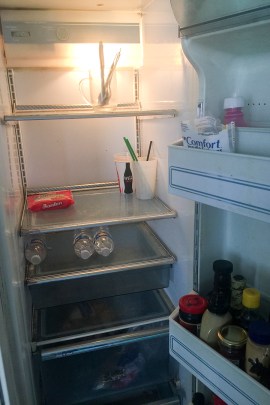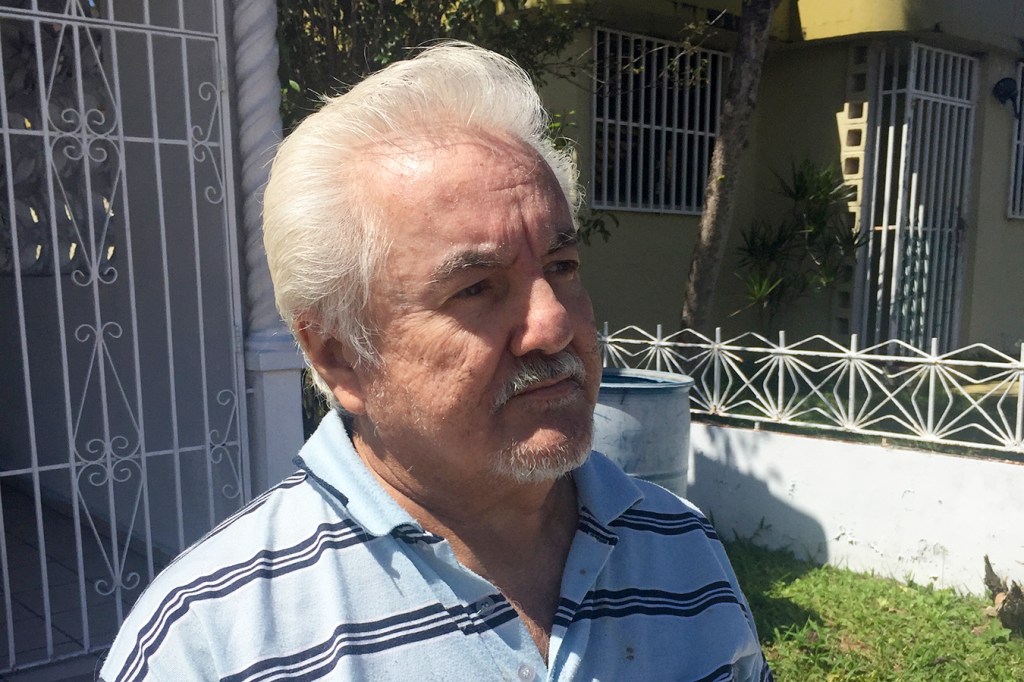SAN JUAN, Puerto Rico — Straddled across Ausberto Maldonado’s backyard in Bayamon, a suburb of San Juan, is a nagging reminder of Hurricane Maria’s destructive power.
“See, that tree broke off that branch, which is as thick as a tree — and now it’s in my yard,” said Maldonado, a 65-year-old retiree.
The downed tree — and the rats attracted to it —prevent Maldonado from hanging his laundry. To get the tree removed, he must show up at a local government office. But the diabetic ulcers on his feet make it painful for him to walk.
After a lifetime of work on the U.S. mainland, picking corn and asparagus and processing chickens in poultry plants, Maldonado returned to Puerto Rico a decade ago to help care for his ailing mother, who has since died. Today the retiree finds himself living day to day on the island. He receives $280 a month in Social Security and $89 a month in food stamps — which alone covers about $3 a day for food.
Six months after Hurricane Maria devastated Puerto Rico and its economy — and killing by some estimates at least 1,052 people — the daily indignities are piling up, especially for people who are frail or elderly. Many are finding their current economic straits nearly as threatening as the storm.
The storm also crippled the island’s power grid, and as of Sunday 86,000 utility customers still had no electricity in their homes and businesses, affecting hundreds of thousands of people.
In the island’s central mountain region, entire towns and neighborhoods continue to rely on finicky and expensive gas-fueled generators, putting the elderly and chronically ill who depend on ventilators and sleep apnea machines at risk. Many homes along the island’s mountainous roads remain entirely in the dark and do not have clean water.
The emergency government support that helped pay for some health care services and medically related transportation needs of Puerto Ricans after Hurricane Maria is running out. Private donations of water and food have slowed. And it’s not clear who, if anyone, will carry on with that work.
Maldonado opened the cupboards in his tidy kitchen. There are a few cans of corned beef, SpaghettiOs and beans. He sounds wistful about what he likes to cook.
“When I have enough food, when I do my groceries,” he said, “I have eggs and bread and coffee and juice for breakfast. I would make spaghetti or some sort of salad and maybe a little dessert” for dinner.
But the oven is unplugged, and there is no juice or eggs or lettuce. It has been months, Maldonado said, since he has had fresh vegetables in the house.
“When there’s very little, then I kinda go on a diet,” he said.
It was hard enough for the retiree to fill his cupboards before the storm, but now, as many aid groups are winding down their donations, Maldonado needs to find money to buy clean, bottled water and to replace his refrigerator, which was ruined during the hurricane.
To buy groceries, he must wait two weeks for his next Social Security check.
“I’m waiting until the 10th so I can go do my grocery shopping again — if I can find a way to get there,” Maldonado said. “That’s when I would have food again, enough to make three meals — lunch, breakfast and dinner.”

Though the light in Maldonado’s refrigerator still works, power outages during Hurricane Maria broke the mechanism that chills the food — and the insulin he depends on. (Sarah Varney/KHN)
Maintaining a decent diet isn’t simply about staving off hunger; diabetes is consuming Maldonado’s foot, and unless he eats healthy food and takes his insulin, doctors have warned him, his foot will need to be amputated.
Maldonado opens the door to his broken refrigerator and points to a vial that holds a few drops of insulin — the last of his supplies until he can afford the $3 copay for refills and find a ride to the pharmacy.
“The pharmacist said it could be stored in a dark place [without refrigeration] for a couple of weeks,” he said.
Ideally, insulin should be kept cool, but broken refrigerators and a lack of power in many homes in Puerto Rico pose grim hazards for the island’s expanding population of people with diabetes.
A visiting nurse, Leslie Robles, who checks on Maldonado monthly, examined the 3-inch-long, gaping wound on his foot. They sat at the kitchen table under a print of Leonardo da Vinci’s “The Last Supper” and sifted through piles of paperwork for Maldonado’s upcoming cataract surgery.
Robles told him that the free medical transportation service the government made available to large numbers of people after the storm is expiring soon, and he’ll no longer qualify for free rides.
But she doesn’t tell him the visiting nurse program she works for, operated by VarMed, a health care management company whose services had been paid for by the government, is shutting down, too.
VarMed has been helping coordinate medical care, social services and housing for thousands of Puerto Ricans for four years. The company, in recent weeks, laid off more than 100 nurses and social workers across the island, as the local government seeks to overhaul its Medicaid contract with insurance companies.
It is unclear how much longer Robles will be able to help Maldonado, and other patients like him, who are on Medicaid and have complex medical needs — the “high cost, high need” patients on the island.
The government wants Medicaid-contracted insurers to develop their own programs for these patients, but the earliest that would happen is this fall.
In the meantime, Maldonado said he has no one to help him shop for groceries, fill prescriptions and get to doctor’s appointments; the volunteers who helped him survive Hurricane Maria are returning to their own lives.
In many ways, he, too, is returning to the same spartan life he had before the storm. But with a weakened island safety net that continues to unravel, and with his own health increasingly tenuous, Maldonado said he feels alone.
This story was produced by Kaiser Health News, an editorially independent program of the Kaiser Family Foundation.


